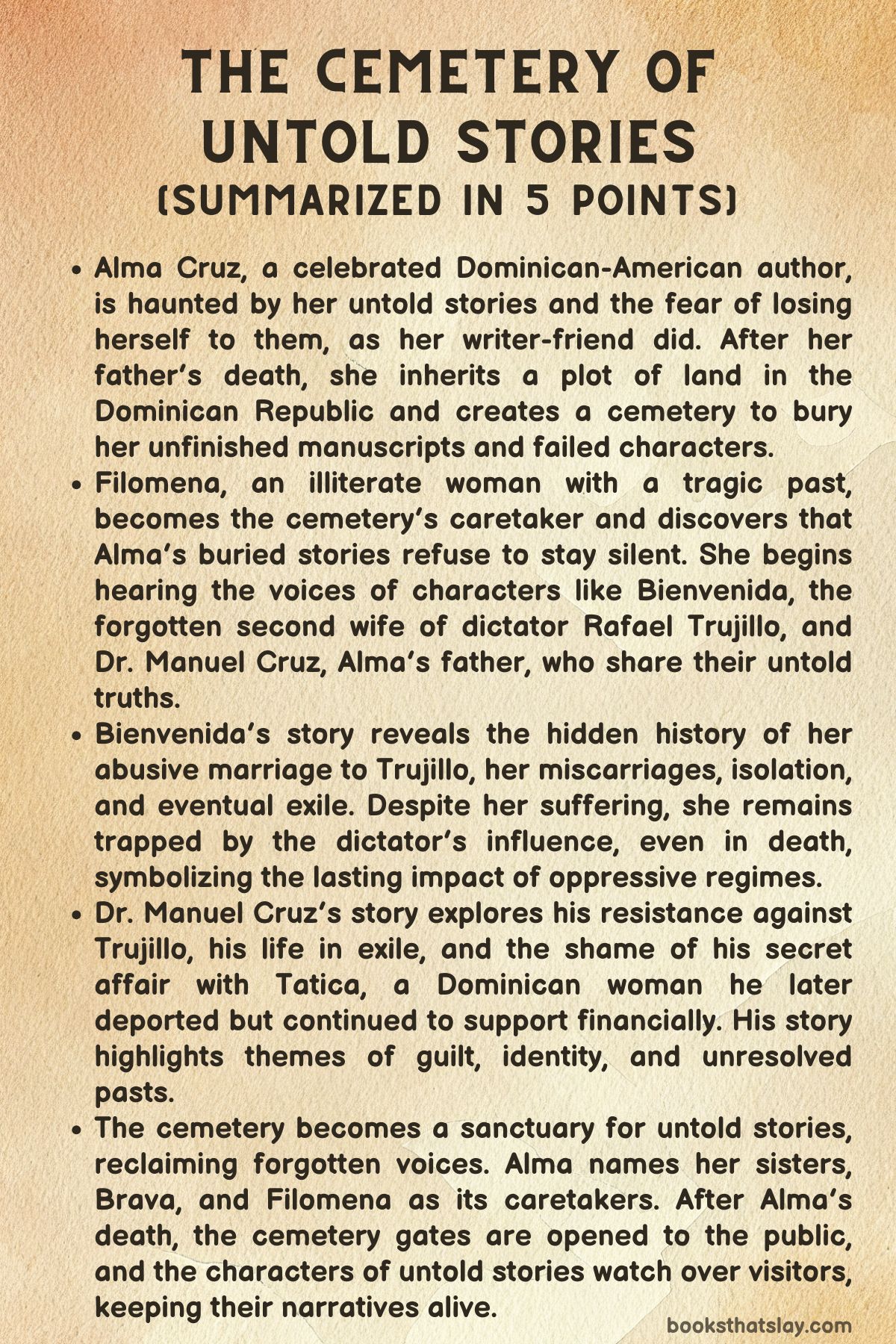The Cemetery of Untold Stories Summary, Characters and Themes
The Cemetery of Untold Stories by Julia Alvarez is an enchanting and thought-provoking novel about storytelling, memory, and identity.
At its core is Alma Cruz, a renowned Dominican writer who feels haunted by the stories she’s never told. In an effort to unburden herself, Alma creates a literal graveyard for these untold narratives on a plot of land in her homeland. But her discarded characters refuse to stay buried, and they begin to tell their own truths through Filomena, the cemetery’s caretaker. Blending historical fiction and magical realism, Alvarez explores whose stories are remembered, whose are forgotten, and how storytelling shapes legacy and history.
Summary
Alma Cruz, a celebrated Dominican-American author, has long been haunted by her untold stories. Her writing career is marked by success, but also by internal struggles — especially after her mentor, a fellow writer, succumbs to madness in her pursuit of a story that remains unfinished.
Alma fears a similar fate and, after the death of her mother, finds herself at a crossroads. Her father, Dr. Manuel Cruz, is brought to the U.S. in his final years, but he remains enigmatic, haunted by a woman named Tatica. After his death, Alma dreams of her late friend urging her to release her unfinished stories before they destroy her.
Alma inherits a piece of land in the Dominican Republic and decides to create a unique cemetery to bury her untold stories.
She hires a local artist, Brava, to craft markers for each grave, and sets a rule that only those who can tell a good story may enter. The first to gain entry is Filomena, an illiterate woman with a tragic past.
She becomes the cemetery’s caretaker, helping Alma burn and bury drafts. Yet two stories refuse to burn — those of Alma’s father, Manuel, and Bienvenida, the forgotten second wife of Dominican dictator Rafael Trujillo.
The narrative shifts to Filomena’s backstory. She grew up poor and suffered horrific abuse at the hands of her sister’s husband, Tesoro.
When her sister Perla discovered the assault, she chose Tesoro over Filomena, leaving her devastated. After years of working as a caretaker for Tesoro’s family, Filomena accepts Alma’s offer to manage the cemetery.
Filomena finds solace there, especially when she begins hearing the voices of Alma’s untold characters.
Bienvenida’s voice emerges from one grave marker. As a young woman, she was charmed by Trujillo, who made her his second wife despite being already married. Though initially devoted to him, she suffered miscarriages and became isolated when Trujillo took mistresses and abandoned her.
Trujillo later had their marriage annulled, leaving Bienvenida in exile. Despite being free after Trujillo’s assassination, she never overcame the psychological hold he had on her.
Meanwhile, Manuel’s untold story comes to life. As a young man, he resisted Trujillo’s regime and fled to the U.S. after a brush with death.
His life in exile was difficult, marked by his failed efforts to validate his medical credentials and his longing for home. In New York, he fell in love with his wife, Lucía, but his affair with Tatica, a cleaning woman at his clinic, became his greatest shame.
After deporting Tatica, he continued sending her financial support until her dementia made her unrecognizable. His silence about Tatica became a symbol of his unresolved guilt.
As the cemetery evolves, it becomes a sanctuary for the stories of the past. Alma names her sisters and Brava as trustees to ensure its preservation. Perla returns to help Filomena manage the site, and the gates are eventually opened to the public.
Alma’s characters live on in this sacred space, guiding visitors through forgotten histories. As Bienvenida’s story is finally published, she begins to fade from the cemetery, but her presence remains, a reminder of the power of storytelling to reclaim lost voices and preserve untold legacies.

Characters
Alma Cruz
Alma Cruz is the central protagonist of the novel and a celebrated writer known for her success. However, her life is marked by creative struggles and a deep connection to her Dominican heritage.
Throughout the novel, Alma grapples with her unfinished stories and the emotional toll they take on her. Her decision to create a cemetery for untold stories reflects her need to reconcile with her creative limitations and personal history.
Her relationship with her family is complicated, especially with her father, Dr. Manuel Cruz. Despite their tension, Alma is haunted by his untold story and the unanswered questions about his life.
Over time, she evolves from a tormented artist to someone who embraces the imperfections of life and storytelling. Alma’s journey illustrates the importance of accepting the unresolved narratives that shape our lives.
Filomena
Filomena plays a vital role in the story as the caretaker of Alma’s cemetery. She is a grounded, spiritual character who becomes a guardian of the buried stories.
Her life is filled with hardship, beginning with a troubled childhood and sexual abuse by her sister Perla’s husband. Despite her illiteracy, Filomena finds solace in listening to stories, which she believes hold a sacred power.
Her connection to the cemetery deepens when she begins to hear voices coming from the graves, particularly those of Manuel Cruz and Bienvenida Trujillo. She respects these stories and dedicates herself to preserving them.
Filomena’s actions, like burying her mother’s trinkets in the plot dedicated to El Barón, show her belief in the importance of memory and storytelling. She ultimately becomes a protector of the community’s collective memory.
Dr. Manuel Cruz
Dr. Manuel Cruz, Alma’s father, is a complex character whose life story is filled with political resistance, shame, and secrecy. He was once an idealistic young man who opposed Trujillo’s dictatorship, which led to his exile.
His struggle to find professional recognition in the United States deeply affects his identity. Despite being a doctor, he works as an orderly due to his foreign credentials not being accepted.
Manuel’s family life is filled with love and regret. His storytelling to his daughters, particularly through the character Babinchi, shows his desire to connect with them, though this effort fades over time.
His affair with Tatica becomes a significant source of shame, and his efforts to cover it up reflect his internal conflict. Manuel’s story reveals the lingering impact of political trauma and personal failures.
Bienvenida Inocencia Ricardo de Trujillo
Bienvenida is the second wife of Rafael Trujillo and one of the most tragic characters in the novel. Her life is shaped by her marriage to the brutal dictator, which brings both privilege and immense suffering.
Initially, she is a hopeful young woman who believes in the promise of her marriage. However, her multiple miscarriages and Trujillo’s abandonment cause her deep emotional pain.
Bienvenida is exiled to Paris and later isolated from her family, reflecting Trujillo’s ruthless control over those around him. Despite her hardships, she remains resilient and works to protect her children from the dark legacy of the dictatorship.
Her story explores the question of why she stayed with Trujillo, even when she knew the truth about his brutality. Her eventual disappearance from the cemetery symbolizes her transition from obscurity to recognition.
Perla
Perla is Filomena’s older sister, whose life is marked by ambition and tragedy. She marries Tesoro, a charming man who ultimately betrays her trust.
Perla’s move to New York with Tesoro reflects her desire for a better life. However, her discovery of his infidelity and abandonment leads her to commit a desperate act of murder.
She kills Tesoro’s other family, driven by a mixture of rage and confusion. This act causes a rift between her and Filomena, but she eventually returns to the Dominican Republic to seek redemption.
In her later years, Perla finds peace by teaching local children to read. Her story illustrates themes of forgiveness and the redemptive power of storytelling.
Tatica
Tatica is a minor but pivotal character who represents Manuel Cruz’s hidden shame. She was a cleaning woman in Manuel’s clinic and became his lover, a relationship he later regretted.
Manuel’s efforts to deport Tatica reflect his desire to protect his reputation and family. However, his ongoing payments for her care reveal the lingering impact of their relationship.
Tatica’s presence in the novel highlights the consequences of secrets and the importance of acknowledging uncomfortable truths. Her story serves as a reminder of the hidden narratives that shape people’s lives.
Tesoro
Tesoro is a manipulative character who represents toxic masculinity and betrayal. He marries Perla but ultimately abandons her for another woman, Vitalina, with whom he has another family.
His sexual assault of Filomena reveals his predatory nature. Tesoro’s actions have lasting consequences for both Perla and Filomena, shaping their life paths.
After Perla kills Vitalina and her son, Tesoro is arrested for murder. His downfall highlights the theme of justice and the repercussions of destructive behavior.
Pepito
Pepito is Perla’s son and represents a younger generation seeking to make sense of the past. His relationship with his mother is strained, but he shows compassion in helping her navigate her legal troubles.
When Perla is arrested for murder, Pepito works to have her deported to the Dominican Republic. He believes that the country’s judicial system will treat her more kindly.
Pepito’s story reflects the novel’s theme of legacy and the importance of understanding family histories. His compassion and dedication demonstrate the power of empathy and forgiveness.
Arístides Ramos
Arístides Ramos is a former police officer who rescues Bienvenida after her suicide attempt. His character represents hope and the possibility of redemption.
He falls in love with Bienvenida and plans to marry her, offering her a chance at happiness. However, Trujillo’s lingering control forces her to end the relationship.
Arístides’ story highlights the personal costs of political power and the challenges of reclaiming agency in oppressive circumstances. He symbolizes the desire for freedom and the resilience of the human spirit.
Themes
The Nature of Untold Stories and the Power of Storytelling
In The Cemetery of Untold Stories, one of the most prominent themes revolves around the inherent power of storytelling itself. The novel focuses on how stories, particularly those left untold or unfinished, persist and shape the lives of the characters even after they have been buried in Alma Cruz’s cemetery.
This cemetery becomes more than just a literal space for discarded manuscripts; it is symbolic of the human need to give voice to experiences and histories that are often silenced or ignored. Alma’s characters, from the ghosts of dictators to the overlooked individuals like Bienvenida and Manuel, continuously push back against the boundaries of her storytelling.
They assert their agency, forcing Alma to confront the uncomfortable truth that some stories cannot simply be hidden or discarded. The novel reflects on the complex relationship between authors and their creations, suggesting that stories are living entities that defy the control of their creators and demand to be heard in their own right.
Memory, Identity, and the Complexities of Family Histories
Memory plays a critical role in The Cemetery of Untold Stories, particularly in shaping identity and uncovering family secrets. Alma Cruz’s relationship with her father, Dr. Manuel Cruz, is central to this theme.
As Alma delves into her father’s past, including his resistance against the Trujillo dictatorship and his secretive nature, she uncovers the complexities of their family’s history. The stories of both her father and Bienvenida reveal how deeply personal memories intertwine with larger national and political narratives.
The loss of memory, as represented through Manuel’s dementia and the tragic memory lapses of characters like Tatica, also serves as a haunting reminder of how history can be distorted or erased. This theme invites readers to consider the weight of forgotten histories, the painful consequences of buried truths, and the tension between the individual’s recollections and the collective narrative.
The Intersection of Personal Trauma and Political Legacy
Alvarez’s novel intricately weaves personal trauma with the political legacy of the Dominican Republic, particularly the trauma inflicted by the brutal dictatorship of Rafael Trujillo. Through characters like Bienvenida, a woman abandoned by Trujillo, and Dr. Manuel Cruz, who fought against the dictatorship, the story delves deeply into how personal lives are indelibly shaped by political regimes.
Bienvenida’s relationship with Trujillo and her eventual disillusionment with the man who once represented her future highlights the impact of political power on the intimate lives of individuals. She is left to grapple with the psychological scars of her marriage to a tyrant, trying to rebuild her life while remaining haunted by her past.
Similarly, Dr. Cruz’s involvement in the underground movement against Trujillo’s regime echoes the complex intersections between personal sacrifice, family obligations, and the larger national struggle for freedom. The novel interrogates the lasting effects of political violence and dictatorship, demonstrating how such regimes create generational trauma that extends beyond mere historical events to shape personal lives, identities, and relationships for decades.
The Struggle for Feminine Agency and the Silencing of Women’s Voices
A significant theme in The Cemetery of Untold Stories is the exploration of feminine agency and the ways in which women’s voices have historically been silenced. Alma Cruz’s journey as a writer is an example of a woman striving for her own voice within a patriarchal society that dismisses or undermines her work.
This struggle is mirrored in the character of Bienvenida, the abandoned wife of Trujillo, whose life is marked by both literal and metaphorical silencing. The story of Bienvenida reveals how women, even those who hold some degree of social power, are often marginalized and reduced to symbols rather than fully realized individuals in history.
Similarly, Filomena, the illiterate caretaker of the cemetery, represents the silent, unseen women of society whose lives are often rendered invisible. Yet, as the story unfolds, these women reclaim their voices—Bienvenida through the stories she shares posthumously, Filomena through her interactions with Alma’s characters, and Alma herself through the very act of writing and confronting her untold stories.
The theme explores how storytelling, in all its forms, can be an empowering act for women to reclaim their narratives, resist historical erasure, and assert control over their identities.
The Morality of Silence and the Consequences of Unwritten Histories
The moral implications of silence, both personal and collective, are central to the novel’s exploration of the consequences of buried histories. Alma’s decision to bury her untold stories in the cemetery is not merely a symbolic act of closure; it reflects the struggle of living with the weight of untold truths and the ethical burden of silence.
Alma’s failure to complete the stories about her father or Bienvenida, and the reluctance to confront the painful past, highlights the complexities of dealing with moral and emotional responsibility. Silence, as portrayed in the novel, is not always a peaceful respite but a dangerous act that allows for the perpetuation of injustice and unresolved trauma.
Characters like Alma’s mother, who disapproves of Alma’s writing, and Manuel, who never shares the truth about his affair with Tatica, embody the different ways silence is used to avoid uncomfortable truths or maintain control over painful realities.
The novel poses important ethical questions: Is it better to remain silent, to protect one’s self or others, or is the moral act to speak out and confront the past, no matter the cost?
By examining this tension, Alvarez asks whether silence, in its various forms, allows for healing or whether it perpetuates the ghosts of the past, which can only be exorcised through storytelling.
The Resilience of Human Connection in the Face of Adversity
Finally, The Cemetery of Untold Stories explores the resilience of human connection despite the overwhelming presence of pain, trauma, and loss. Through the relationships formed among the characters, particularly between Alma and Filomena, and the posthumous connections forged by Alma’s creations, the novel illustrates the enduring power of human relationships to transcend even death.
Alma’s eventual decision to create a sanctuary where stories can be shared and acknowledged fosters a community where the characters and their struggles live on through their narratives. Filomena’s ability to connect with the stories in the cemetery, despite her own tragic history, represents the strength of human empathy.
It is through shared stories, even untold ones, that the characters find a sense of meaning and belonging. The enduring love between Bienvenida and Manuel, the lingering memories they share in the cemetery, demonstrate that while lives may be cut short or lived in isolation, the connections between people—through their stories—continue to offer solace, understanding, and even redemption.
In the end, the cemetery is not just a place for forgotten stories, but a testament to the resilience of human connection, which defies time and circumstances.


